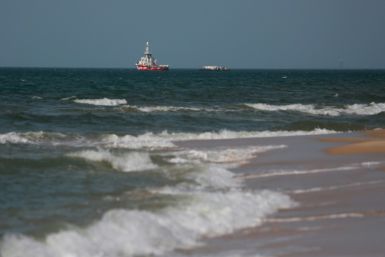Can North Korea Missiles Hit Washington? Kim Jong Un Regime's Latest Ballistic Missile Test Fails

North Korea test-fired a ballistic missile from a site in South Pyeongan province north of Pyongyang early Saturday, South Korean and U.S. military officials said. The launch came just hours after Secretary of State Rex Tillerson led a ministerial meeting of the United Nations Security Council Friday where he spoke about Pyongyang’s advancing nuclear and missile programs.
Saturday's missile test, which ended in failure, was the second consecutive failure in the past two weeks. The missile apparently exploded just seconds after the launch. On April 16, Kim Jong Un's regime tested a ballistic missile near its submarine base on the country’s east coast but the launch failed as the projectile exploded just after liftoff.
“The missile did not leave North Korean territory,” Dave Benham, a spokesman for the United States Pacific Command, said. “The North American Aerospace Defense Command determined the missile launch from North Korea did not pose a threat to North America.”
Read: Will There Be A Nuclear War With North Korea?
Tensions in the Korean Peninsula have increased lately as North Korea continues its nuclear advancements in retaliation to U.S.-South Korea military drills, which Pyongyang says are a threat to its security. Meanwhile, U.S. officials have also raised concerns over the North's tests as the reclusive country had made repeated attempts to miniaturize nuclear warheads and fit them on long-range missiles capable of reaching Washington.
"North Korea disrespected the wishes of China & its highly respected President when it launched, though unsuccessfully, a missile today. Bad!" President Donald Trump wrote on his Twitter account.
Earlier this month, the U.S. warned it would unleash a pre-emptive strike against North Korea if it felt a significant nuclear threat was imminent. North Korea retaliated by saying it would “hit the U.S. first” if the U.S. planned a strike.
North Korea retaliated by saying it would “hit the U.S. first” if the U.S. planned a strike.
“By relentlessly bringing in a number of strategic nuclear assets to the Korean peninsula, the U.S. is gravely threatening the peace and safety and driving the situation to the brink of a nuclear war,” North Korean officials said, according to the state news agency KCNA. “This has created a dangerous situation in which thermo-nuclear war may break out at any moment.”
It is unclear if North Korea has already developed its long-range missile that could reach the U.S. However, senior U.S. military officials have earlier claimed that even if such a missile wasn't ready so far, the country is likely well on its way to mount a small nuclear warhead onto a long-range missile.
Meanwhile, on Friday, Tillerson warned of "catastrophic consequences" if the U.N. Security Council did not act, saying it was "likely only a matter of time before North Korea develops the capability to strike the U.S. mainland."
Trump said in an interview Thursday that even though he wanted to handle North Korea's threats with diplomacy, a major conflict could not be ruled out.
“There is a chance that we could end up having a major, major conflict with North Korea. Absolutely,” Trump told Reuters. “We’d love to solve things diplomatically but it's very difficult.”
In the interview, Trump also credited Chinese premier Xi Jinping for assisting the U.S. in its efforts to control North Korea and its nuclear program. However, he later indicated that China’s role in “trying to reign in Pyongyang” came with its set of limitations, despite his claims that he had “established a very good personal relationship with President Xi.”
© Copyright IBTimes 2024. All rights reserved.











